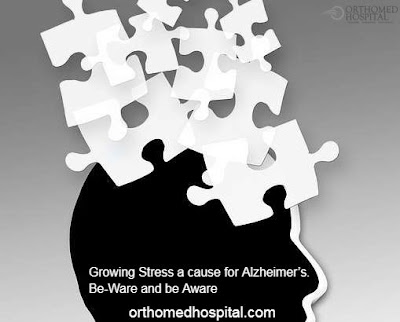 |
| Best Orthopedic Clinics in Chennai |
Stress! The most common problem of the 21st century. Are you or your loved one at loggerheads? If the answer is Yes! Read on. More and more people often complain of problems remembering familiar names, phone number or where they have put their glasses, keys etc.
Loss of memory, is a common train in the elderly is a common train but surveys prove otherwise. Surveys show that loss the symptoms are more common in the elderly and they are increasingly seen in middle-aged and younger individuals. Many are understandably concerned about whether they will go on to develop Alzheimer’s disease (AD) or have mild cognitive impairment (MCI) that does not significantly impair their normal function and may not progress.
How stress becomes a cause of Alzheimer’s Feeling Stressed for long periods of time is most likely to increase the likelihood of developing Alzheimer’s says a new study. The good news however here is that taking the right steps to manage and reduce stress is one of the sure-shot ways to maintain good brain health and ward off memory problems with age. High levels of stress in people of 70 and older are linked to an increased risk of mild cognitive impairment, a form of memory loss that often preceded Alzheimer’s disease.
Neurons involved in chronic anxiety and fear ‘extensively overlap’ in areas that are associated with Alzheimer’s disease say, scientists. Researchers have also found that people who have experienced high and persistent levels of stress are twice likely to develop mild cognitive impairment than those who feel less stressed.
Fortunately, stress is a modifiable risk factor for cognitive impairment thus making it a potential target for treatment. The perceived stress reflects on daily hassles that we all experience as well as the way we appraise and cope with these events. Perceived stress can be altered by mindfulness-based stress reduction, cognitive-behavioural therapies and stress-reducing drugs.
The interventions may postpone or even prevent an individual’s cognitive decline. Stress can cause inflammation to the brain making it more susceptible to health problems like dementia. Stress can lead to depression and other related forms of the disease.
What happens inside the body in case of chronic stress going beyond control? If we are chronically stressed and experience chronic “dis-stress” as a result then they are constantly releasing cortisol. Think of cortisol as nature’s built-in alarm system. It is your body’s main stress hormone which works with certain parts of your brain which controls mood, motivation and fear.
Like red wine, too much of a good thing can spell disaster. Chronically high cortisol have shown to cause brain cell dysfunction, killing brain cells and causing atrophy of the brain. With ageing, something additional also happens. Biological systems may go into a tizzy and de-regulated, our ability to shut them down can, in turn, become more impaired with ageing.
When cortisol levels go up, they can stay up for longer and also go down slower. We become more prone to the psychological effects of stress if we are dis-stressed and the effects can last longer. The Department of Neurology at Orthomed provides comprehensive consultative services, diagnostic testing and treatment for neurological conditions which include diseases of the brain, spinal cord, nerves and muscles. Do you suspect that stressful life events can lead to Alzheimer’s and have you seen the effects of stress on brain health in your family? Do share us your stories with us in the comments section below.
Note:
This Content Originally Published By orthomedhospital. Source Link: https://www.orthomedhospital.com/blog/growing-stress-a-cause-for-alzheimers-be-ware-and-be-aware/
No comments:
Post a Comment